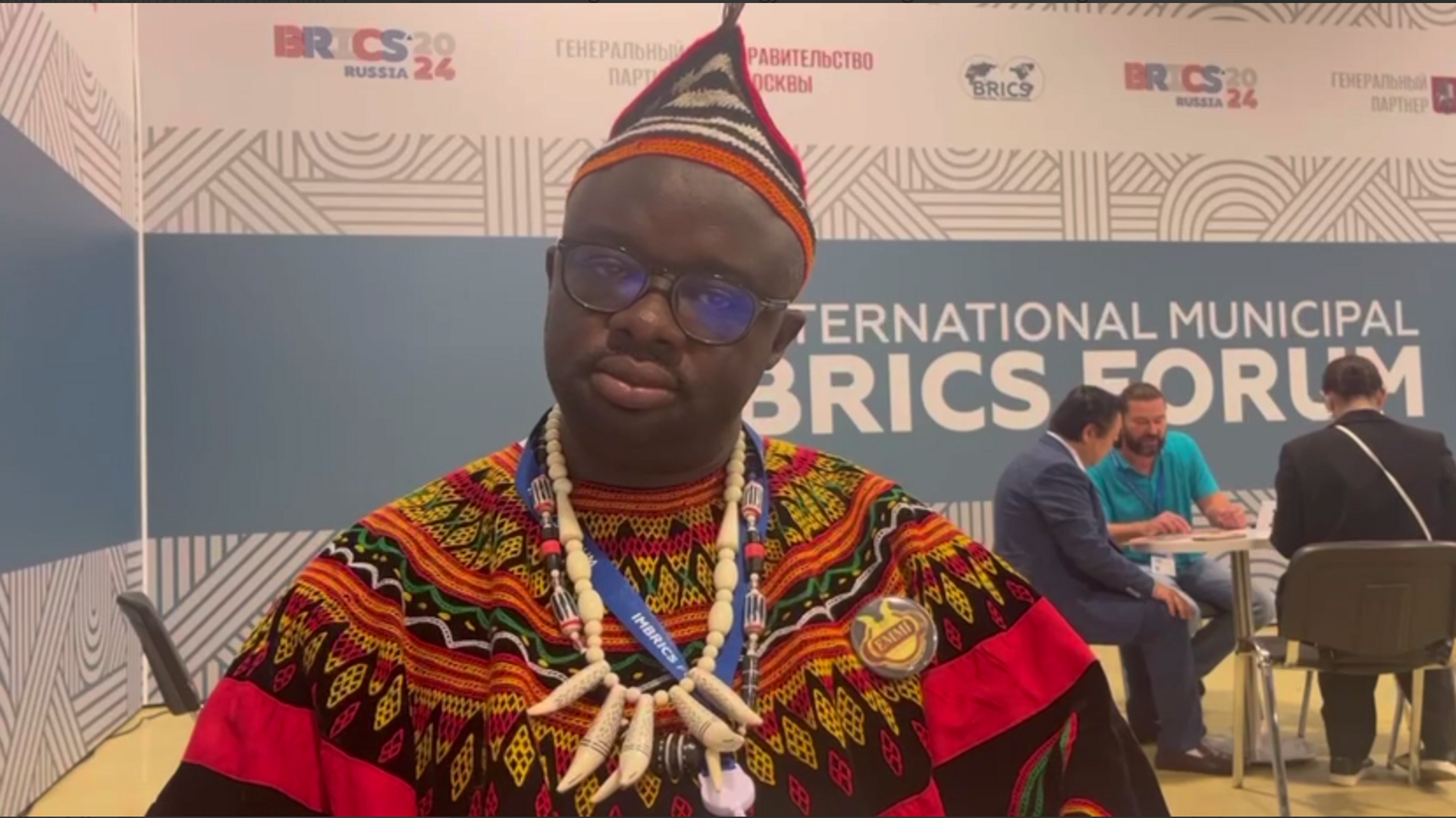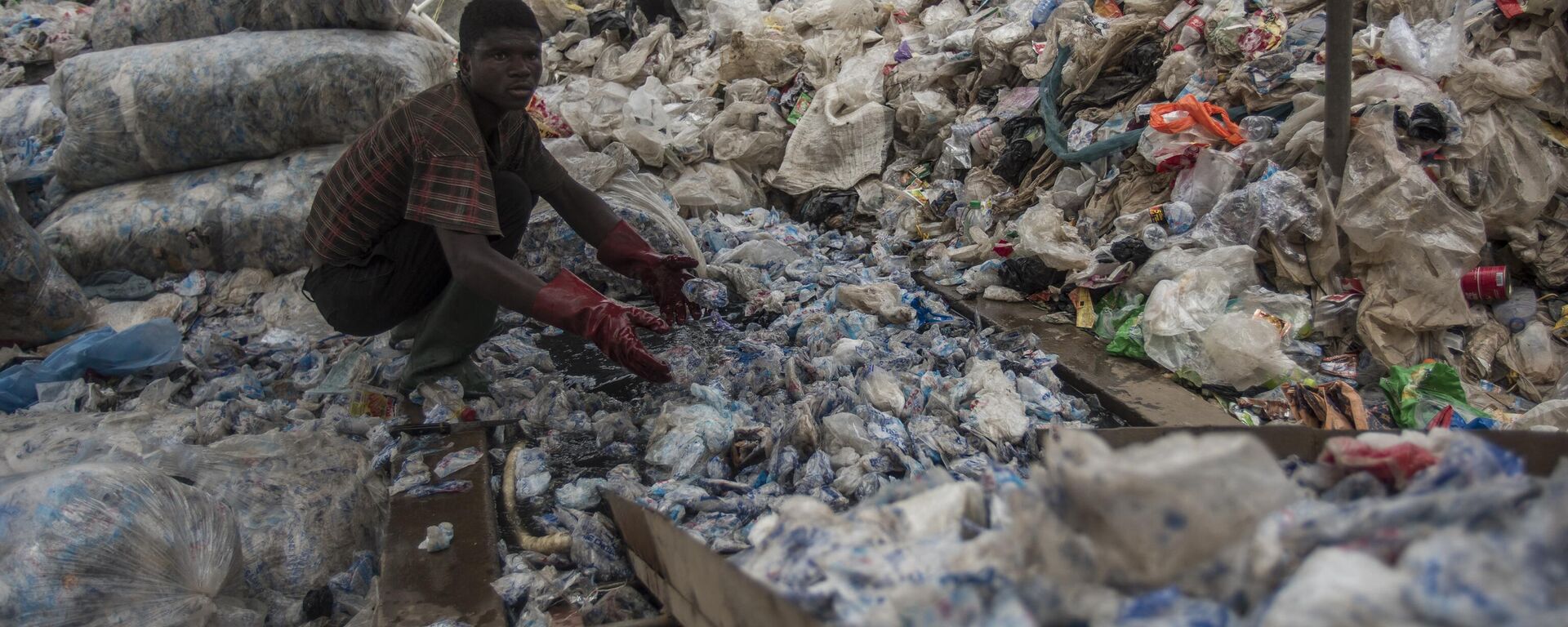https://en.sputniknews.africa/20240829/brics-municipal-forum-set-to-transform-waste-recycling-in-cameroonian-municipality-councillor-says-1068057078.html
BRICS Municipal Forum Set to Transform Waste Recycling in Cameroonian Municipality, Councillor Says
BRICS Municipal Forum Set to Transform Waste Recycling in Cameroonian Municipality, Councillor Says
Sputnik Africa
The International Municipal Forum of the BRICS countries took place in Moscow on August 27-28. It became an important platform for exchanging experiences and... 29.08.2024, Sputnik Africa
2024-08-29T18:57+0200
2024-08-29T18:57+0200
2024-08-30T13:20+0200
opinion
africa in details
brics
cameroon
moscow
sputnik africa
waste
recycling
environment
education
https://cdn1.img.sputniknews.africa/img/07e8/08/1d/1068058087_21:0:1680:933_1920x0_80_0_0_c0497a901d13e28de60788e158ad18fe.png
Learning waste management strategies from BRICS will "immensely" benefit Cameroon's Tubah municipality, Julius Fuli, a municipal councillor in the municipality, told Sputnik Africa.Fuli went on to explain how recycling works in the municipality: In the Tubah community, waste is collected and sorted into categories such as plastic, wood, and leather. The plastic is then used to create bricks by combining it with sand, which is utilized for road construction. The organic waste is converted into organic manure, which is highly beneficial for the community since a large portion of Tubah's residents are farmers—this organic manure has significantly boosted agricultural yields.Additionally, the revenue generated from producing construction bricks has increased the municipality's income. The use of these affordable bricks has also improved accessibility within the municipality. Moreover, the establishment of a mini recycling plant in Tubah has addressed the issue of garbage dumping.The recycling system appears to be working well. However, the councillor explained why improvements are needed.The official noted that he has accumulated substantial knowledge on managing and modernizing recycling efforts during the forum. With additional technology and potential financial support from BRICS, they could expand these initiatives. This expansion would result in increased production of valuable end products, such as bricks for road construction and organic manure, which would greatly benefit the community.Since no initiative can be realized without quality education, Fuli expressed hope that BRICS could assist in translating students' knowledge into practical applications for everyday life. He emphasized the importance of integrating such technology into the educational system to ensure that what is taught in school directly benefits students in their daily lives. He believes this approach will significantly aid both the students and the broader community.In conclusion, the speaker shared his thoughts on the BRICS Municipal Forum as a whole. He noted that connecting with other municipalities provides a platform for ongoing interaction, knowledge exchange, technology sharing, and financial collaboration, which, in turn, fosters mutual development. The forum offers a valuable opportunity to communicate with each other and explore ways to enhance both economic and social well-being, Fuli concluded.
https://en.sputniknews.africa/20240408/russia-may-build-waste-treatment-plant-in-ghana-amid-growing-waste-recycling-issue-in-african-state-1065978845.html
cameroon
moscow
central africa
Sputnik Africa
feedback@sputniknews.com
+74956456601
MIA „Rossiya Segodnya“
2024
Christina Glazkova
https://cdn1.img.sputniknews.africa/img/07e7/0b/07/1063380906_0:0:673:674_100x100_80_0_0_79628b4d0cd9f29291a57aa13bbf9e7a.jpg
Christina Glazkova
https://cdn1.img.sputniknews.africa/img/07e7/0b/07/1063380906_0:0:673:674_100x100_80_0_0_79628b4d0cd9f29291a57aa13bbf9e7a.jpg
News
en_EN
Sputnik Africa
feedback@sputniknews.com
+74956456601
MIA „Rossiya Segodnya“
Sputnik Africa
feedback@sputniknews.com
+74956456601
MIA „Rossiya Segodnya“
Christina Glazkova
https://cdn1.img.sputniknews.africa/img/07e7/0b/07/1063380906_0:0:673:674_100x100_80_0_0_79628b4d0cd9f29291a57aa13bbf9e7a.jpg
africa in details, brics, cameroon, moscow, sputnik africa, waste, recycling, environment, education, central africa
africa in details, brics, cameroon, moscow, sputnik africa, waste, recycling, environment, education, central africa
BRICS Municipal Forum Set to Transform Waste Recycling in Cameroonian Municipality, Councillor Says
18:57 29.08.2024 (Updated: 13:20 30.08.2024) Christina Glazkova
Writer / Editor
The International Municipal Forum of the BRICS countries took place in Moscow on August 27-28. It became an important platform for exchanging experiences and ideas between representatives of regional and municipal governments from the BRICS countries, as well as for building effective business communications with entrepreneurs.
Learning
waste management strategies from BRICS will "immensely" benefit Cameroon's Tubah municipality,
Julius Fuli, a municipal councillor in the municipality, told
Sputnik Africa.
Fuli went on to explain how recycling works in the municipality: In the Tubah community, waste is collected and sorted into categories such as plastic, wood, and leather. The plastic is then used to create bricks by combining it with sand, which is utilized for road construction. The organic waste is
converted into organic manure, which is highly beneficial for the community since a large portion of Tubah's residents are farmers—this organic manure has significantly boosted agricultural yields.
Additionally, the revenue generated from producing construction bricks has increased the municipality's income. The use of these affordable bricks has also improved accessibility within the municipality. Moreover, the establishment of a mini recycling plant in Tubah has addressed the issue of
garbage dumping.The recycling system appears to be working well. However, the councillor explained why improvements are needed.
"The Tubah municipality is made up of about 420,000 inhabitants [...] and given that it has the [...] State University within the region, it brings in an additional, approximately, 20,000 people. And with this number of students and the inhabitants, there is an impending need to manage the waste within the municipality," he said.
The official noted that he has accumulated substantial knowledge on managing and modernizing recycling efforts during the forum. With additional technology and potential financial support from
BRICS, they could expand these initiatives. This expansion would result in increased production of valuable end products, such as bricks for road construction and organic manure, which would greatly benefit the community.
"We intend to modernize because this artisan method being used is not efficient given the number of students coming in. [...] BRICS [Municipal Forum] is going to help us bring in knowledge, machinery, and financial backup so that together we can see how we can modernize and make our community what we envisage it to be in the near future," Fuli added.
Since no initiative can be realized without quality
education, Fuli expressed hope that BRICS could assist in translating students' knowledge into practical applications for everyday life. He emphasized the importance of integrating such technology into the educational system to ensure that what is taught in school directly benefits students in their daily lives. He believes this approach will significantly aid both the students and the broader community.
In conclusion, the speaker shared his thoughts on the BRICS Municipal Forum as a whole. He noted that connecting with other municipalities provides a platform for ongoing interaction, knowledge exchange,
technology sharing, and financial collaboration, which, in turn, fosters mutual development.
The forum offers a valuable opportunity to communicate with each other and explore ways to enhance both economic and social well-being, Fuli concluded.



